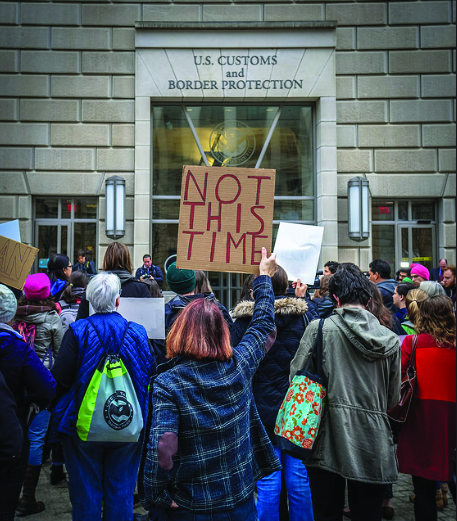I am writing in response to the University’s recent decision to invite Immigration and Customs Enforcement (ICE) to table at the St John’s Career Fair, an invitation that was maintained despite student and faculty objections and demonstrations. Although I am glad to hear that ICE has decided not to attend the fair, I think it is worth reflecting on why this decision has resonated so strongly with so many.
As a teacher of First Year Writing at the Institute for Core Studies, I always center my classes around travel and travel writing. It is often that first travel experience that stays with students. It’s a wonderful entry point into larger questions of identity and culture. I ask that students focus particularly on the passport — that government-issued document — as a way of reflecting critically on this sense of identity and the larger structural issues of travel that it reveals.
There is always a point during the semester, though, where differences emerge regarding these travel experiences. And it is always students of color (especially Muslim students) who recount instances at checkpoints when they were pulled out of line by TSA or when their luggage was more closely scrutinized, and so forth. It never fails. We can say that border security is apolitical, that it is colorblind, but this does not change the consistency of these stories or who these security measures impact most directly. Hearing these stories — actually listening to students — you can understand the legitimate complaints they have when they hear that an organization like ICE, which operates with a similar mandate, will be tabling on campus.
This issue is personal to me as well. Down where I live, in Bay Ridge, Brooklyn, we have had several well-publicized instances where ICE has tried to deport members of our community. One was the story of Joe Chen, a long-time resident of Bay Ridge, congregant of the Good Shepherd Lutheran Church. He was a husband and father to two small children, and an undocumented immigrant, who was being threatened with deportation during his regular ICE check-in (an absurd ritual that he has dutifully performed for years).
The other story, which gained national attention, was that of Pablo Villavicencio, the pizza delivery man who was detained at the Fort Hamilton Army base because he did not have the proper documents. He was turned over to ICE by the Military Police, detained for over a month — a month apart from his wife and children — and threatened with deportation.
The Bay Ridge community came out each time in support of these men. We worked with local churches, social justice organizations, as well as the New Sanctuary Coalition (NSC) in order to bring attention to these cases. Community members accompanied Joe to his ICE check-in, participated in the “Jericho Walk,” and organized rallies in support of Pablo, working alongside the Legal Aid Society and other organizations. In both cases they were granted a stay and, in Pablo’s case, ordered released from detention. These stories had happy endings. So many more do not. Without such organizing and without the kind of moral leadership that we saw from local residents, churches, religious organizations, and political leaders there would have been two more families separated for reasons that remain difficult to defend. The conversations in my community have now turned to the difficult work of building sanctuaries, even as ICE continues to expand its operations and push its’ mandate. In this light, the student response to the events on campus were heartening to say the least.
The freedom and benefits of travel and mobility are key to the St John’s mission and to its identity as a global institution as we see with the premium that we put on Study Abroad, for example. This is because travel brings with it a change in perspective and an increase of knowledge about the world that cannot be obtained through books alone. But as we send students across the globe, we need also to be mindful (and make them mindful if they are not already), of how we are treating and talking about those who come across our borders, whether for opportunity or for refuge.
In these days of walls and bans, what message are we sending students? How are we living up to our mission when we point them not towards careers which benefit from travel but careers in which they are being asked to curtail the mobility and freedoms of others?








